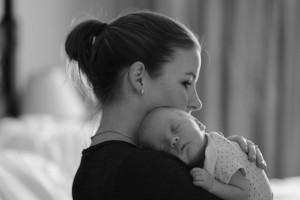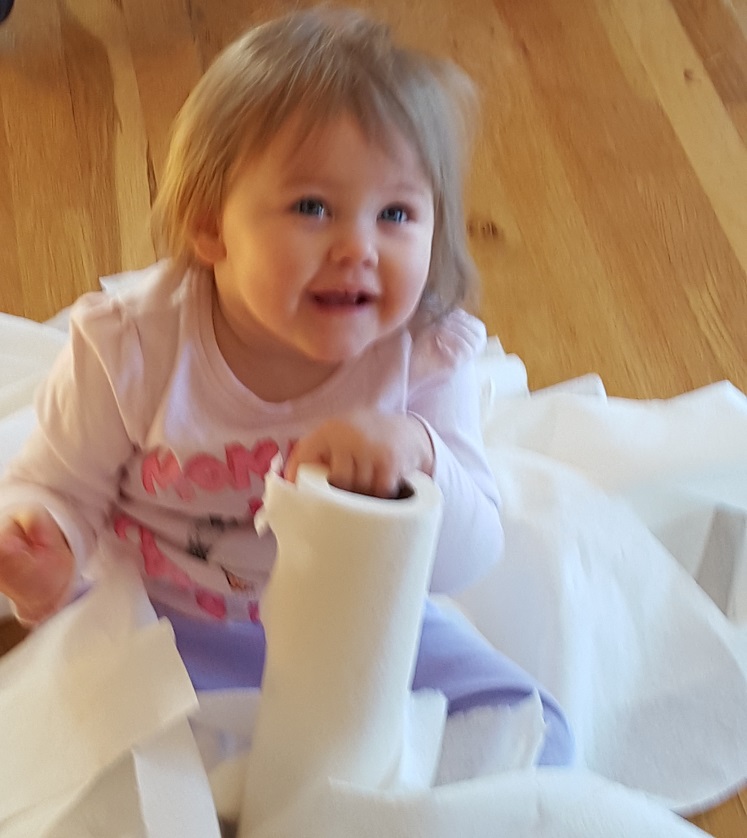by Author Chris White, MD – ICPA.org:
Let’s be honest—crying is tough on the nervous system. It’s designed to be. When children have an unmet need that is beginning to cause a disruption in their nervous system, they cry, or get really whiney, as a direct reaction to the discomfort. The crying then enters us through our senses—mostly through sound, but visually, as well, if we see their contorted faces and the tension in their bodies. Then it travels from the sensory areas of our brain, into the limbic system and down into our bodies, all resulting in this feeling: “Something is wrong, and I have got to fix it now!” Since crying usually is the signaling of a dysregulated nervous system—usually that some need of the child’s has not been met—it is important that we pay attention to our instincts and respond by going to the child and finding out what is wrong.
Whether the crying is coming from your infant because he is hungry, or if he is colicky and needs to release the tension accumulated from the day—in either case, go to him. Perhaps it is coming from your clingy toddler who is in her rapprochement phase of development—pushing hard for independence in some moments, but seemingly terrified of you leaving the room in others. Still, when she lets out those blood-curdling screams that seem so dramatic when you’re just going downstairs, respond to her anyway. Her fear is real.
Or maybe your 5-year-old just took a spill on his bike in the driveway and is starting to bawl. You saw the whole thing and know he isn’t gravely injured; go to him anyway. He may need for you to be close by to help move easefully through the tears, and digest the shock of the bike crash.
In each of these cases, your child’s nervous system is doing what it is designed to do: make distress calls to his caretakers when he feels he needs some help. It is important to take these distress calls seriously by finding out what your child needs.
But don’t take crying too seriously.
Many times I see parents become dysregulated themselves whenever their child cries. They come running in, yelling, “What’s wrong?!?” and find that the child was simply frustrated because he was unable to get a toy to work right, and was a little overtired, so his frustration bubbled over into tears. The dysregulated mother may then get irritated with her son and say, “Why are you having a hissy fit over something so small? Pull yourself together!” What great advice, for both child and mother!
Even in a situation like this, where a child’s crying is over something relatively minor, she still needs comfort and to be brought back to a state of better regulation. More frustration and anger are not going to help. Discharging your own dysregulated emotions will only add to the child’s sense of frustration and lack of support.
In other situations, I have seen parents go running to their kids whenever they cry, as if trauma will ice over their nervous systems forever. They explode onto the scene with an intense, anxious fretting and nervous dancing around, trying to make everything perfect so the child won’t experience any discomfort. These parents seem to be afraid of tears, and will do anything to keep their children’s state “sunny and 75 degrees” at all costs. Their anxiety is, in itself, somewhat dysregulating, and their children get the unspoken message: They are fragile, they can’t handle the bumps and bruises of life, and they’ll always need Mommy nearby to make things right. These kids grow up believing that they are made of glass.
As a parent, do your best to “get yourself together” before dumping your own anxieties or frustrations on your kids. Try to understand your own histories around crying and other states of dysregulation like frustration, anger or an intense compulsion to make everything go right. Inquire into why your particular nervous system reacts the way it does. Most likely, it formed this way in an attempt to protect you from a lack of attunement you experienced as a child. Have compassion for yourself: We are all still children in so many ways.
If you are one of those moms or dads who gets intensely activated by hearing your child cry (I know I still do from time to time, especially if I am awoken from sleep!), there are some things you can do to help soothe your limbic reactivity.
The next time you hear your child cry, remember:
• Crying is a communication of need; rarely is it anything serious.
• Crying is also, oftentimes, the intelligent response of the nervous system when tension needs to be released. The movement of tears and sobbing are ways the body cleanses itself of toxicity and potentially “frozen memories” that might otherwise get stored as trauma.
• Whatever the cause of the crying, you will be of sounder mind and more spacious heart if you begin getting yourself together as you move toward your child.
Try these things to help get yourself together the next time your child’s crying revs up your nervous system:
• Even as you reflexively get up to go to your child, mentally note the intensity that your body and mind are experiencing. Feel the electricity or warmth or tension in your body as you continue to move to your child’s side for support, and remind yourself that this is how the body is supposed to react to crying.
• Grounding down is a great way to smooth out the intensity and stay level-headed as you move to help your distressed child. Inhale deeply into the belly, and then, as you exhale, imagine the breath going down from your belly, through your pelvis and legs, and exiting down into the earth. Make the exhale as long as possible (this activates the calming parasympathetic nervous system) and release it through an open mouth with a little Haaaaaaaa sound from the back of the throat. This will leave you in a clearer state of mind, and feeling more “warrior like” to meet whatever challenge presents itself.
• Get spacious. Even as you arrive to find out that nothing too serious is wrong—that no major fire needs extinguishing—take your child up in your arms and begin breathing deeply as you hold him. Again, try to gently emphasize the exhale, as this is very calming—to both your system as well as your child’s. And as you are holding him, let the exhale and your awareness dissolve outward in all directions, creating a feeling of vast space to hold this difficulty. In my experience, all difficult feelings run their course more quickly and gracefully when I give the difficulty room to breathe and allow Kai (my son) to be exactly where he is at emotionally, and allow his nervous system to heal itself in its own way, in its own time. Get spacious and trust the process.
• Let it flow. As you hold your child, you will probably feel the natural response of your heart—its kindness and sensitivity and compassion—flow from you into all pain and suffering: your child’s and your own. There is no need to work hard to make everything all right; no need to fret and try to placate or distract her from the tears. Just stay grounded, stay spacious, and let the natural kindness of the heart pour from you effortlessly.
Step by Step
Over the next two weeks, pick one of these suggestions to work with when your child cries. You might start with simply becoming aware of how your body feels when you hear your child cry. Once awareness is established and becomes second nature to you, try adding “grounding down” or “getting spacious.” Or if you often feel you need to distract your child from his tears—to give him a treat or something else to focus on—consider instead simply giving him room to have his tears in your loving arms. Your quiet confidence will ignite and support his innate capacity for resilience.
Crying is usually a signal of some unmet need, and therefore deserves to be taken seriously and responded to. But if we allow the fear-based part of our nervous system to spread a wildfire within us, we won’t be able to respond in the most effective, loving and spacious way possible. Develop a basic trust in the nervous system and its cycles of tears. Your openness and confidence will help your children mature into healthy, vibrant, courageous beings.
Article originally posted at ICPA.org.









